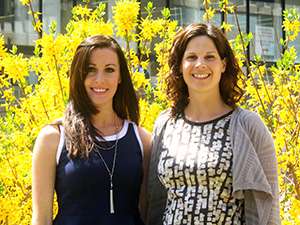Anxious men fare worse during job interviews, study finds

Nervous about that upcoming job interview? You might want to take steps to reduce your jitters, especially if you are a man.
People who are anxious perform more poorly in job interviews, and the effect is worse for men than women, according to new research from the University of Guelph.
"Most job applicants experience interview anxiety prior to and during interviews," said psychology professor Deborah Powell, who conducted the study with PhD student Amanda Feiler.
Anxiety often shows up as nervous tics, difficulty speaking and trouble coming up with answers, all of which are known to influence hiring outcomes, she said.
While men are no more anxious than women during job interviews, they experience significantly greater impairments from anxiety, according to the work published recently in the journal Personality and Individual Differences.
The study involved 125 undergraduate students who participated in a mock interview: 43 men and 82 women. Participants rated their own anxiety levels and had their anxiety and interview performance evaluated by an interviewer.
Overall, anxious men and women were rated lower on interview performance than their less-nervous counterparts. But nervous men were penalized the most, ranking far below equally nervous women in post-interview measures. The researchers have several theories to explain the results.
"It could simply be that people have stereotypes about anxiety and that it's more socially acceptable for a woman to be anxious," Powell said, "while for men, it may look out of character. They may be expected to be less emotional and more assertive."
Feiler said women and men might deal differently with anxiety, with women more likely to use effective coping strategies.
"They may practise being interviewed with a friend or seek emotional support by talking about their fears," she said. "On average, men tend to engage more in avoidance. As a result men do less to prepare for the interview and perform worse."
But what is clear, the researchers said, is that anxiety impairs candidates' ability to perform in the job interview. "It would be advantageous for both men and women to learn to effectively deal with their interview anxiety," Feiler said.
More awareness among interviewers would also help, Powell added.
"Employers need to remember that interviews are anxiety-provoking. If people are feeling anxious, they might do more poorly in an interview than they would otherwise, and employers may be missing out on good candidates."
Telling job candidates what to expect during the interview, including the types of questions to be asked, may reduce anxiety, Powell said.
Now planning to explore possible treatments, Feiler and Powell are recruiting new study subjects. They're seeking University students and members of the general public who suffer from high levels of anxiety during the job interview.
"We know that interview anxiety is detrimental to performance in the job interview, so the logical next step for me is to discover strategies that are empirically based that would help," Feiler said.
In the meantime, Powell has a few tips for job candidates to help reduce interview anxiety:
- Learn as much as you can about the company and about the selection procedures you'll go through so that you're not surprised on the day of the interview. Taking some of the uncertainty away from the selection process and interview might lower interview anxiety.
- Practice employment interviews by having a friend interview you. Trying to anticipate interview questions would be helpful and spend some time thinking about your past work experiences (so you're not fretting about recalling past job experiences in the moment).
Research also suggests that when people are anxious, they appear are less warm and enthusiastic, which two key determinants are of interview performance, Powell said. "It is important that job candidates' nerves do not affect the impression they are giving to interviewers."
People should also remember that interview anxiety is not necessarily transparent, she added. "You may not look as nervous as how you feel. Try not to think too much about how nervous you appear to the interviewer."



















